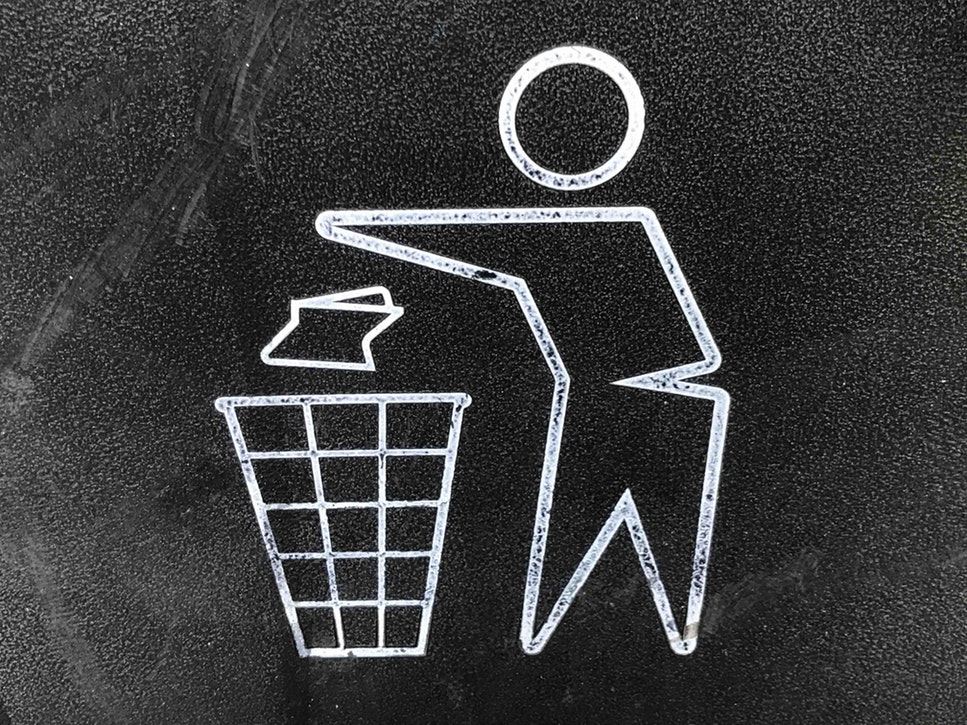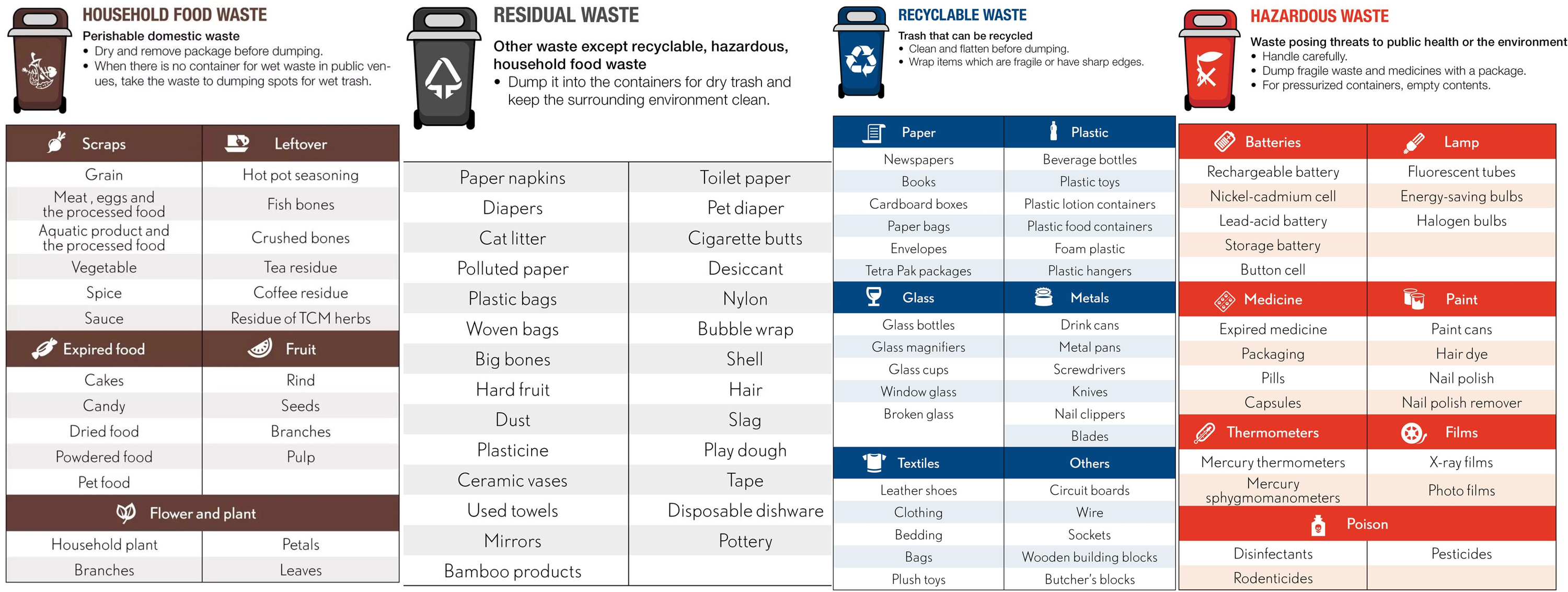Rubbish. That’s the word on everyone’s lips at the moment in Shanghai, where a new waste management scheme has been introduced, imposing strict rules on what can and can’t be thrown into which bin. A city once home to some of the most laid-back waste disposal regulations is now heading towards having some of the toughest, with heavy punishments being dished out to rule breakers – whether they’re acting intentionally or by mistake. The policy has got the whole city talking, but what exactly does it entail?
Waste Disposal in China
Despite previous talk of introducing rubbish sorting and recycling schemes, China has made little progress towards catching up with neighboring Japan and Taiwan. Until now that is. In March 2017, the Chinese government declared that they would launch pilot waste management schemes in 46 major cities by 2020. Should the schemes run effectively in these cities, a standard procedure will be rolled out countrywide. The twofold plan is not only an attempt to improve environmental efforts, but also to transform China’s international reputation as the largest producer and least effective disposer of waste.
As the nation’s most international city, Shanghai sits at the forefront of its development. It is often used as a testing ground for new initiatives such as this, that the government hopes to later implement nationwide.
Home to a mind-boggling population of 25 million, Shanghai is not only the country’s most populous city, but also its largest producer of waste. To put it into perspective; Shanghai’s municipal waste disposal plants deal with more than 19,000 tonnes of residual waste and more than 5,000 tonnes of kitchen waste every day. This is in comparison to the mere 3,300 tonnes of recyclables that don’t get mixed up and burned along with the non-recyclable waste they are often disposed with.
Shanghai’s Pilot Waste Disposal Scheme
Until earlier this year, Shanghai’s residents were blissfully unaware of the major environmental issues caused by improper waste disposal. Many were used to freely dumping their trash wherever they pleased, so, such strict new regulations have sent the city into panic, as citizens frantically try to get to grips with how, where and even when to dispose of their trash.
Slogans, posters and instructional videos about rubbish separation began appearing everywhere, from office buildings, schools and kindergartens to residential communities, parks and shopping malls. Schools across the city began educating Shanghai’s youth on the topic, in the hope that they can encourage their parents and grandparents to change their lifelong habits and pave the way to a more environmentally friendly China.
In preparation for the regulations to come into effect, communal bins in housing communities across the city were replaced by new installations, volunteers called upon to help manage the scheme and widespread propaganda campaigns launched in an attempt to spread awareness.
Shanghai’s citizens are obliged to follow strict garbage sorting guidelines that separate rubbish into four main categories; Household Food, Residual, Recyclable and Hazardous Waste. Not only must waste be separated, but all food containers, drinks bottles and packaging must be cleaned and dried before being placed in waste bins. Food waste may be chucked into plastic bags in the household, but when it comes to throwing it in the public bin, it must be emptied, and the bag thrown in the residual waste bin. The same goes for toilet tissue, which cannot be thrown down the toilet due to plumbing issues. Failure to adhere to the rules will result in individuals facing fines of up to 200 RMB, and companies up to 50,000 RMB.
Not only must people abide by the rules of how to sort rubbish, but also when to throw it. In an effort to keep a close eye on who is putting what where, the local government has introduced certain times between which residents are permitted to throw out the trash in housing complexes. Since the policy came into effect, anyone wishing to dispose of their trash must do so between the hours of 8-10am and 6-8pm.
Of course, in a city of 25 million, enforcing such rules is no easy feat. But they are certainly giving it a good go. Since its launch, thousands of community volunteers have begun inspecting rubbish disposal in housing complexes. Those who are found to be incorrectly separating rubbish will have the chance to correct it or face a fine.
Some communities have even gone so far as to install bins that residents must sign in with their house number to use, in order to keep track of who is participating in the scheme. Those who don’t risk having their address shared with the local government, who may even make house visits.
Being Made Crazy by Rubbish
For a city that has never taken such a matter too seriously, the rules are causing confusion among citizens. Since the introduction of the regulations, the hashtag #DividingRubbishSoonSendsShanghaiCitizensCrazy (#快被垃圾分类逼疯的上海居民) has gone viral on Weibo, China’s answer to Facebook. Meanwhile, one of the hottest apps in Shanghai is now one that helps users sort their rubbish by helping them identify which bin it belongs in.
Though many are happy to see such positive steps being made towards promoting environmentally friendly behaviour in China, the harsh and sudden implementation of rules and risk of financial punishment has left many concerned. Having got used to the convenience of throwing rubbish out wherever, whenever, some are disgruntled with the new measures they are having to take to ensure they adhere to the rules.
While some see it as a burden, others consider it an opportunity. The city’s entrepreneurial minds are using this widespread reluctance and uncertainty surrounding rubbish separation to their advantage; a handful of shops and individuals have launched waste sorting services, which involve them visiting people’s homes to collect waste and throw it in the right bin, at the right time. Such services range from an affordable 30 – 70 RMB per month, which is proving to be a worthwhile investment for both the confused and the busy, who would much rather pay someone to else deal with it for them.
Despite the sudden frenzy, it seems citizens generally have a positive attitude towards the scheme. It’s widely accepted that it will take time for such regulations to have the desired effect on people’s habits. But, given how far they’ve come since the beginning of the year, it seems China is really starting to get serious about environmental change.
Has this inspired you to begin your own teaching adventure in China? Explore our programs or head to our application page to get started today!



Leave A Comment
You must be logged in to post a comment.